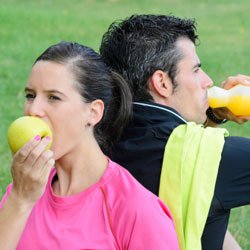If you’re training for an hour or more at least twice a week, you’ll get huge benefits from following basic sports-nutrition guidelines. Here are some simple strategies you can use to elevate your game, shed unwanted pounds and get the most out of your workouts!
Eat often. We want to maintain your blood sugar throughout the day, so if you are feeling a bit hungry, grab a healthy snack like raw nuts or fruit. By eating healthy foods often, you’ll avoid that famished state that leads to overeating and/or reaching for unhealthy foods.
But don’t eat until you feel full. Call it a cruel trick of nature, but your brain doesn’t register your food intake until 20 minutes after you eat. Chowing down can over burden your digestive system and lead to a massive drop in energy. Eat slowly – chew each morsel of food at LEAST 30 times before swallowing and savor each bit. Stop eating when you are about 80% full; if you’re still hungry later, you can eat more.
Carb up, but not too much. Most athletes need a good helping for carbohydrate rich foods to train hard and recover properly. This may conjure up heaping plates of pasta and garlic bread, but eating too many carbohydrates will only slow you down and make you sluggish; just think about how tired you feel after a big pasta meal and you know what we’re talking about. A healthy portion of carbohydrate looks like this for the average adult: breakfast of oatmeal with blueberries or a couple slices of whole grain toast smeared with almond butter and a piece of fruit; a big salad for lunch loaded with veggies, such as spinach, tomatoes, cucumber, carrots and bell peppers; and a medium sweet potato or yam with dinner.
Power up with protein. You need protein to help rebuild and repair muscle tissue. However, most athletes way overdo it on protein because we are often taught ‘more is better’. Here is what the average adult athlete needs to meet their protein needs: half cup of yogurt and/or soy milk with breakfast; a can of tuna or ½-1 chicken breast on your salad at lunch and a deck of cards sized piece of salmon or other flesh protein with dinner. You’ll also want to nosh on raw nuts and seeds and/or through in a cup of beans, peas or lentils for a snack or appetizer.
Refuel during the Fuel Window. When you work out, your body releases a hormone called cortisol to help you adapt to the stress and release calories for fuel. However, once your workout is over, too much cortisol causes your body to store fat and prevents muscle recovery. Therefore, we need to halt cortisol production ASAP after working out. You can do this by eating the right blend of carbohydrate and protein within 45 minutes of working out; this time is often referred to as the Fuel Window, because your body is primed to take in nutrients. Down a sports drink and have a protein bar or smoothie during the fuel window to reduce cortisol and speed recovery.
Eat real food. The preservatives and additives in processed foods – like fast food, deli meats and most things with a shelf life longer than a couple weeks – disrupt your metabolism, reduce energy and slow down recovery. Fresh (preferably organic) fruits and vegetables, raw nuts and seeds, pasture raised meats and wild caught fish are a cleaner source of energy and will keep you running strong for years to come.
Do these simple things every day and see what a difference it makes!!


